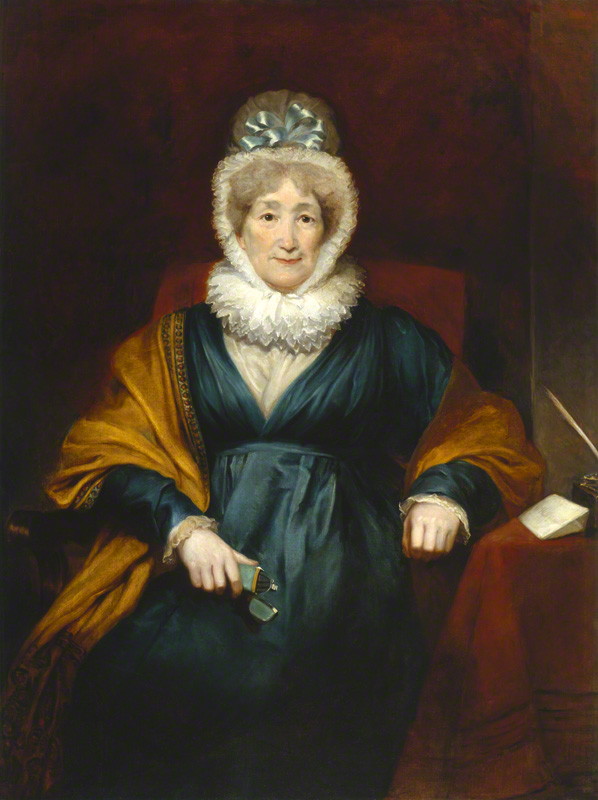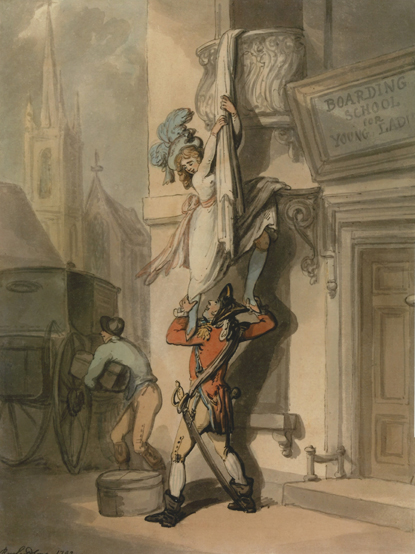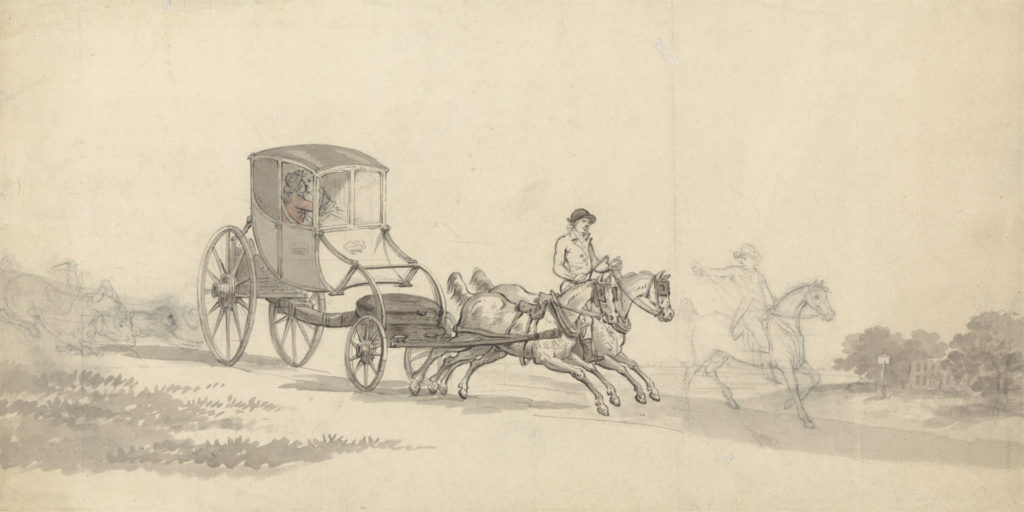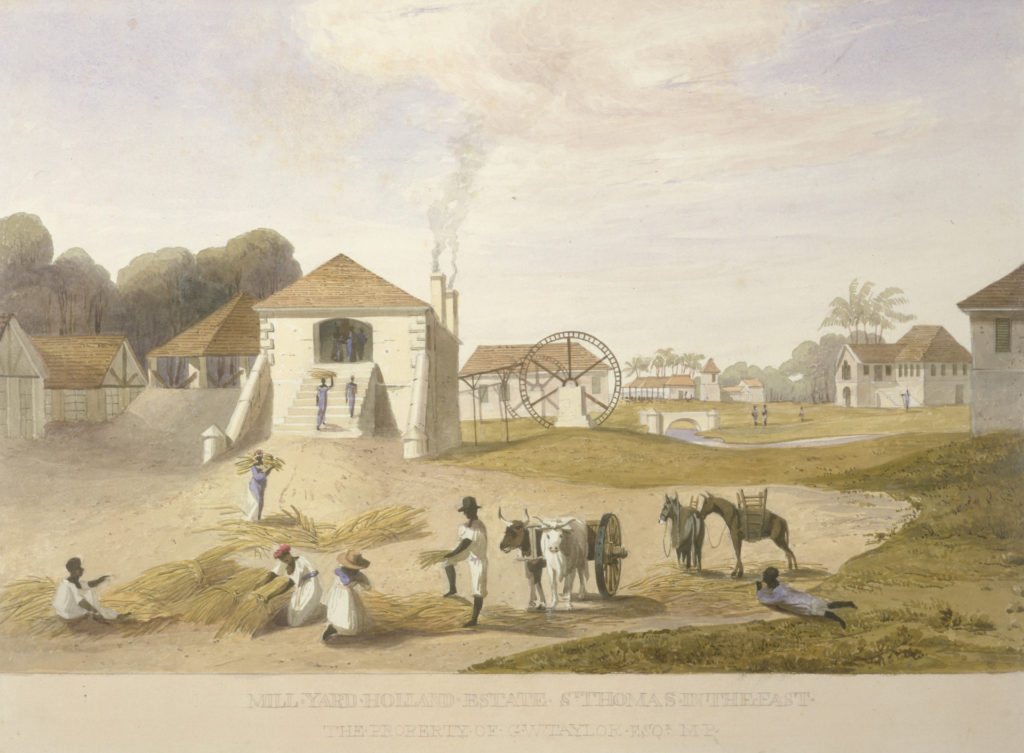Twenty-six years before Maria Glenn was taken from her uncle’s house in Taunton, Clementina Clerke was duped into a getting in to a coach and taken off to Gretna Green to be married. The case came to be known as ‘The Bristol elopement’.
Clementina Clerke was “modest, amiable and obliging, timid and not forward.” In 1791 she attended a small boarding school in Park Street, Bristol run by sisters Mary and Selina Mills, who had bought it from Hannah More, the renowned Evangelical educationist. Clementina’s immediate family was not wealthy—her Scottish father was a shoemaker—but her uncle had made a fortune in Jamaica and left his vast sugar estates to her. Ironically, he had just disinherited her brother for marrying clandestinely. He was left the sum of a hundred pounds.

Hannah More, by Henry William Pickersgill (1821). Via National Portrait Gallery
While walking on the Bristol Downs with her friends, Clementina was targeted by Perry, a Bristol apothecary. Later, he described the moment he fell for her:
As if the God of Nature by an exercise of a particular providence had directed their steps contrary to its general and immutable laws, their [that is, his and Clementina’s] eyes met in attraction, and with a kind of electrical fire shook them to their souls.
He did not mention her extremely attractive fortune nor that he was spurred into action when he overheard Clementina’s guardian, Mr. Gordon, talking loudly about Clementina in a Bristol pub. Her inheritance was not protected by the Court of Chancery.

Thomas Rowlandson’s salacious commentary on boarding school elopement.
On 19 March 1791 Perry sent the Miss Mills a note purporting to be from Mr. Gordon inviting Clementina to tea with her aunt, Mrs. Ogilvie. He decked out a carriage and horses in livery resembling that used by Mr. Gordon and sent it to the school. Selina Mills said later in court that Clementina, in low spirits following the recent death of her father, had asked the Mills sisters to go with her, proving that she had no inkling of what was about to happen to her. Unfortunately, the Mills sisters both declined Clementina’s invitation, which altered the course of their pupil’s life irrevocably.
Clementina stepped into the chaise and was promptly whisked away. Shortly afterwards, a second note told the Mills sisters that Clementina would be spending the night at her guardian’s house. This gave Perry, Clementina now in his clutches, and with a treacherous servant from the school on hand, a helpful head-start on the journey north to Gretna Green.

Samuel Howitt, A Chaise and Pair, With Post-Boy (undated). Courtesy of Yale Center for British Art, Paul Mellon Collection.
After the abduction was discovered Mary Mills set off in hot pursuit, but was too late. Perry and Clementina were already married when she met them at Carlisle on their way south. She asked Perry if she could speak to “Miss Clerke,” but Perry—a pistol in his hand, according to newspaper reports—just scoffed and said there was no such person. He only had Mrs. Perry and the servant in the carriage, he said, and he knew of no business Miss Mills had with either.
The couple fled to Europe, a dogged Mary Mills still on their tail, and it was only when Clementina’s friends offered an olive branch of forgiveness that they returned to England. Clementina’s mother accepted the fact of their marriage and, fearful that a Scottish marriage was not quite legitimate, insisted that the couple marry again in London; Miss Mills, however, indicted Perry for feloniously stealing Clementina and marrying her against her consent. London fizzed with the story, every episode of which was reported in the papers. The Times published a piece full of heavy double entendres about Mary Mills’ encounter with Perry and the pistol, and scurrilous engravings were exhibited publicly.
When Mary Mills’ case came finally before the Bristol court in 1794 Perry was defended by Thomas Erskine, the leading barrister of the day, who had himself eloped to Gretna Green over twenty years previously (and much to his first family’s disappointment did so again in 1818). Erskine went head-to-head with William Fielding, the son of Henry Fielding, the novelist and Justice of the Peace, for the prosecution. It was a tetchy and noisy hearing frequently interrupted by the thousand-strong crowd outside shouting ‘Perry for ever!’ When Clementina, now aged seventeen and pregnant with her second child, took the stand and stated that she knew exactly what she was doing when she got into the liveried chaise, everyone understood that Perry had won. He was chaired by the jubilant mob, who carried him and Clementina through the streets of Bristol and pulled his carriage.
Perry later took the name of Clementina’s benefactor, becoming Richard Perry Ogilvie. After a spell in Edinburgh he reinvented himself as a poet, producing several pamphlets of works, including Fame, Let Thy Glorious Trumpet Sound!, a eulogy on the victory and death of Lord Nelson, and The Battle’s Hot Hour.
It is likely that Ogilvie squandered Clementina’s fortune. In 1810 he was imprisoned for debt in the Abbey prison (an apartment within Holyrood Palace). He was also probably the driving force behind a case he and Clementina pursued against her brother.

James Hakewill, Mill Yard, Holland Estate, St. Thomas in the East, Jamaica (c. 1820). Courtesy of Yale Center for British Art, Paul Mellon Collection.
In 1817 he is recorded as the owner of 147 slaves on his estate at St Mary’s. We do not know to what extent the estate was indebted.
Clementina had died in Bath four years earlier, reputedly in a condition of great poverty.1
TRIAL TRANSCRIPT
A pamphlet giving a transcript of Perry’s trial, with a highly biased introduction (possibly written by Perry himself), is available at Cornell University’s Trial Pamphlets collection.
THE BRISTOL ELOPEMENT: NEWSPAPER SOURCES
An elopement of a singular nature took place in Bristol on Saturday evening. A Creolean nymph of the name of Clerke, who is possessed of £25,000 and who will have £6000 a year when of age, eloped from the Park Street Boarding School, with a Mr Perry, a surgeon and apothecary of Bristol, for Gretna Green. Although the young lady is only fourteen years of age, the affair was managed with the greatest secrecy and judgment. A note was sent to the school, supposed from Mr Gordon, an eminent merchant of that town, who was her guardian, desiring that the schoolmistress would permit Miss Mills to go to his house to tea with his family; and at the same time, a carriage with horses and liveries resembling those of Mr Gordon was sent to convey her. A second note was sent shortly after, intimating, that on account of company, Mr G should keep the young lady at his house till morning. In the interim, the lovers, accompanied by her maid, and a friend of the gentleman’s, set out in a post-chaise and four, unfortunately before they had completed the first stage, the carriage was overset and broken to pieces, they, however procured a fresh chaise, and proceeded on their journey. The schoolmistress on the following day discovering the cheat, and gaining intelligence of their route, pursued them; but the lovers having a start on her near twenty-four hours, it is most probably the pursuit will prove fruitless.
Reading Mercury, Monday 28 March 1791
Miss Clarke, the heiress, whose elopement is mentioned in this paper, was in mourning for her uncle, Mr Ogilvie, by whose will she inherits so considerable a fortune: it is a singular circumstance that her brother, Mr Clarke, had been originally left the half of his uncle’s fortune, but having married clandestinely, Mr Ogilvie a few days before he died, altered his will, and left him only one shilling.
Leeds Intelligencer, Tuesday 29 March 1791
BRISTOL ELOPEMENT
Bristol, March 23.
Miss Clerke, a young lady of the age of 14 years, and who will be possessed of £6,000 per annum, with a considerable share of ready money, eloped from her boarding-school, in Park-street, Bristol, on Saturday night last, for Gretna-green. The affair was managed in the following manner: a carriage, horses, and a livery servant, were procured so as to look exactly like those of the young lady’s guardian; they drove up to the boarding-school, the servant producing a letter in the name of the guardian, well counterfeited, to Miss Mills, requesting that Miss C. may be suffered to spend the evening at his house at Clifton, that a relation of her’s, who was just arrived, and under the necessity of leaving town that evening for London, might have the pleasure of seeing her. The young lady suffered, with her maid, to pay this visit, but instead of visiting at Clifton, she found her way to Stokes Croft, to the house of her admirer, a surgeon, where they remained till eleven o’clock at night, when they set out in a chaise and four, accompanied by her maid, and a gentleman of his acquaintance.
Miss C. not coming home at night, Miss Mills concluded that she was detained to sleep at her Guardian’s, nor was the circumstance understood until she was missed from church on the following day. The Gentleman with whom she went off was not known until late on Sunday Evening; – a number of young fellows were suspected; strict enquiry was made for every Gentleman of the Sister Kingdom; at last it was discovered that Mr. P. had ordered the chaise and four to the turnpike from the White Hart, and that he got silver for four guineas. These circumstances, and his not being seen in town, put the affair out of all doubt.
At half after ten o’clock last Sunday night Weekes, from the Bush, Miss Mills and her brother, set out Post after the Runaways, which will avail little, as the Lovers have had twenty-four hours “law”.
The parties were married on Thursday at Gretna Green. The governess has nothwithstanding advertised a reward of 100 guineas for the apprehension of the bridegroom and the recovery of the bride: the former being charged on oath before a magistrate on suspicion of “feloniously and forcibly carrying off the young lady”. Clergymen are also cautioned against marrying them in England.
Hereford Journal, Wednesday 30 March 1791
BRISTOL, MARCH 25
Weekes, Miss Mills, and her brother, arrived here last night. They were met near Carlisle by Mr and Mrs Perry, on their return from Gretna Green, on Tuesday morning at ten o’clock. Miss Mills went up to the carriage, and requested to speak to Misss Clerke. Mr P replied, there was no such person in the carriage. Miss Mills again begged she might speak to “the child,” but got no answer. Mr P assured her there was no person to answer that description in his company; he said he had Mrs Perry and a servant in the carriage; and that he knew of no business Miss Mills had with either. He flattered himself the lady he meant would excite her further attention.
During the conversation Mr P held a pistol in his hand, and afterwards drove off by a bye road towards London, where Miss Mills set out for this morning. Every step that can possibly affect Mr P will most certainly be taken. The Scotsh gentlemen, with whom he is to fight this battle, are determined, if possibly, to keep the property in safe hands.
Mrs Perry has contradicted, by a public advertisement, the suggestion that she was taken away by force, and requested that no credit may be given to a report “injurious to the honour of her husband, and to her own happiness.”
Caledonian Mercury, Thursday 31 March 1791
…Mrs. Perry has contradicted, by a publick advertisement, the suggestion that she was taken away by force, and requested that no credit may be given to a report “injurious to the honour of her husband and her own happiness!”
Bath Chronicle and Weekly Gazette, Thursday 31 March 1791
Miss Mills and the guardian of the run-away Miss Clerke are now in London, in order to obtain the Lord Chancellor’s opinion of what is best to be done in regard to Mr Perry, the apothecary, of Bristol. The fugitives were met near Carlisle, on their return from GG, and on Miss Clerke’s being demanded by her late governess, Mr Perry said, there was no such person, and presenting a pistol, swore he would blow her brains out if she offered to stop her. Miss Clerke is not 15, and never saw Mr Perry before in her life; and the only knowledge he had of her, was his having heard a few days before that she would inherit a large fortune. A servant maid at the school was accessory to the elopement.
Ipswich Journal, Saturday 02 April 1791
Mr Perry and his young wife are gone off to the continent. He came to town after his own marriage and wished to consult the Solicitor General, who declined to enter on the business, but advised him to get away as soon as possible, as he thought he was not safe in England. The girl was certainly carried away witout her consent, and it is said to be a fact, that she neve saw her husband until after she left the boarding school.
The statute of 4th and 5th of Philip and Mary, c. 8, enacts, that if any woman child, or maiden, being above the age of 12 years, and under 16, contract matrimony, contrary to the said statute, that hten her next heir shall enjoy all such lands and hereditaments as she had in possession, reversion, or remainder.
Bath Chronicle and Weekly Gazette, Thursday 14 April 1791
The account in the London papers of the capture of Mr Perry and Miss Clerke at Ostend is untrue. The following particulars may be relied on: Miss Mills, with proper assistance, pursued them to Ostend, where she learned they were gone to Brussels; and she immediately set off from Ostend, intending to go to that place. At Ghent she gained intelligence that they were in that town, and she discovered the house in which they were; application was immediately made to the magistrate to have them secured, who ordered the gates to be shut, but would not go father, unless he was indemnified by the mother and guardian of Miss Clerke. They both being in England, the indemnification could not be given, and the parties were left at large in Ghent.
Hampshire Chronicle, Monday 2 May 1791
THE BRISTOL ELOPEMENT
The accounts which have hitherto appeared of the fugitives are erroneous:
The only persons who accompanied Miss Mills to Ghent, were Mr Leslie and Mr Halliday: on their arrival in that city, they found that Mr Perry and Miss Clark had taken a house there for a year, which gave him the privilege of a burgher, by the recommendation of a Mr Van Cunningham; at the residence of this person the two gentlemen made enquiry where the house was situated, but did not obtain the wished for information. In the mean time Mrs C went out and gave the run-away pair an intimation of the pursuit, by which means they effected their escape, and were not taken on Wednesday last, though the pursuers were making every possible attempt to discover their route by sending expresses to different places. A requisition has been made from this country to the Magistrates on the Continent that in case they should be taken, to deliver them up; to which the only reply was, that the young lady, if captured, should be confined in a convent until restored to her mother.
Mr Perry, therefore, in all probability will not speedily return to England, even if apprehended.
Caledonian Mercury, Thursday 5 May 1791
It is said a reconciliation has taken place between Miss Clerke who eloped from Bristol with Mr Perry, and her friends; by which their exile will be put an end to.
Bath Chronicle and Weekly Gazette, Thursday 16 June 1791
At the last quarter sessions for Bristol, the Grand Jury found a bill of indictment against Richard Perry, surgeon and apothecary, for feloniously stealing from Miss Mill’s boarding school, on the 19th of March last, Miss Clerke, an heiress.
Bath Chronicle and Weekly Gazette, Thursday 11 August 1791
The trial
BRISTOL SESSIONS
THE KING AGAINST RICHARD PERRY, ESQ
The prisoner was arraigned on an indictment charging him with forcibly taking away Clementina Clerke, from the boarding school of Miss Mills, she being under the age of sixteen years; and marrying her against her consent, contrary to an old statute passed in the third year of Henry 7th, which constitutes such an offence capital felony.
Mrs Barbara Ogilvie said, she married the late Mr Ogilvie, and knew Miss Clerke, his niece, about four months before she went to Miss Moore at Bristol, where she conducted her and left her; and that she was then about ten years old, that is in the year 1785 or 1786.—But speaking to this fact, by report only, it was resisted as insufficient, when a certificate of her baptism was produced, as procured by George Sutart from the Registry at Banff, dated April 29, 1786. This, however, being no proof of her birth, was of no weight. Mrs Ogilvie then said, her husband died in January 1791, and Mrs Perry’s father in February following; that she knew very little of William Gordon, who paid her school bills.
Miss Mills said, she kept a boarding school for young ladies in Bristol, and that Miss Clerke had been with her about one year and a quarter, that she was modest, amiable and obliging, timid and not forward, that she heard of the death of her father, by a letter which Miss Mills opened, and was much agitated; that on the 18th of March 1791 a chaise came to her door with a man in livery, who delivered to her a note written in the name of Mr Gordon, requesting her to send Miss Clerke to his house, where some relation in Scotland had lately arrived; that Miss Clerke seemed very indifferent about going, and asked her and her sister to go with her, which for very trifling reasons they declined.
John Jones said, he was a postilion at the White Hart in Bristol; that in March 1791 he drove a post-chaise to Stokes Croft Turnpile, when he stayed one hour and half, then turned back. Some men called to him by the Full Moon to take up at Mr Perry’s where he stopped about a minute; that a lady then got into the coach with her servant and three gentlemen, all of whom he drove to Newport, eighteen miles from Bristol, and the road to Gloucester; that they there changed horses while they sat in the coach, and he saw them go off the other stage.
On his cross-examinaiton by Mr Fielding, he said they all appeared very cheerful and happy, galloping helter skelter to be married in Scotland.
Joseph Paisley, commonly called the Blacksmith Parson now appeared. He said at Gretna Green he married Mr Perry and Mrs Perry about three years ago; he then produced the certificate he had granted, which Mr Perry had left on the road; and was afterwards found by a stranger in the country. He said further, that Mr and Mrs Perry’s head were bound up, in consequence of their being overturned in their coach, but that they appeared like other people – that they behaved well enough and he saw nothing amiss in them. The marriage ceremony is very short, and the parties stayed with him about an hour.
Mary Thatcher, late Miss S Mills, said she went to Mr Gordon’s but Miss Clerke had not been there;that she went near Scotland with Mr Weeks and met a [illegible] Clarke, Betty Baker and a man; that she called out, “For God’s sake, Miss CLerke, speak;” when Mr Perry jumped up from his seat, held up a pistol to her face, ad said, “There is no Miss Clerke here, but Mrs Perry is:” kthat Weeks said, “Perry, let Miss Mills speak a word to her;” when he answered, “Not one word, by God,– drive on.”
Mary Baker was produced, but taken away in a fainting fit.
The evidence on the part of the prosecution being finished–
The horses were taken from Mr and Mrs Perry’s carriage, and they were drawn by the people to their house in Clifton.
Counsel for the prosecution, Mr Nathaniel Bond, Mr Long, and Mr Griffiths.
For the prisoner, Mr Erskine, Mr Fielding, Mr Mills and Mr Dawes.
NB The bells rang on the occasion throughout the city.
Caledonian Mercury, Monday 21 April 1794
October 11, 1794
BIRTHS
At Montrose, the Lady of Richard Vining Perry Esq (formerly Miss Clerk, niece of Mr Ogilvie of Langley Park) of two daughters.
The Scottish Register, 1794, vol iv
Clementina Perry Ogilvie sues her brother.
An interesting postscript showing that Clementina was still remembered, at least by some:
A female imposter, who passes by the name of Clementina Perry, has been lately laying the inhabitants of Bath, and the neighbouring towns, under contribution. She is a middle-aged woman, of the middle size; she sometimes pretends she came from the island of Jamaica in search of her husband, and is accompanied by a little girl, of about nine years of age, who, it is pretended, can speak nothing but Spanish, having been educated in the island of Cuba.
The Glasgow Herald, 1 January 1810
DEATHS
Sept. 16, 1813
At Bath, aged 38, Clementina, wife of Richard Perry Ogilvie, Esq.
Gentleman’s Magazine and Historical Chronicle 1813, July – December, page 403
William Wilberforce’s biographer Anne Stott compares Perry to Jeremy Forrest, who fled with his 15-year-old lover to France.
